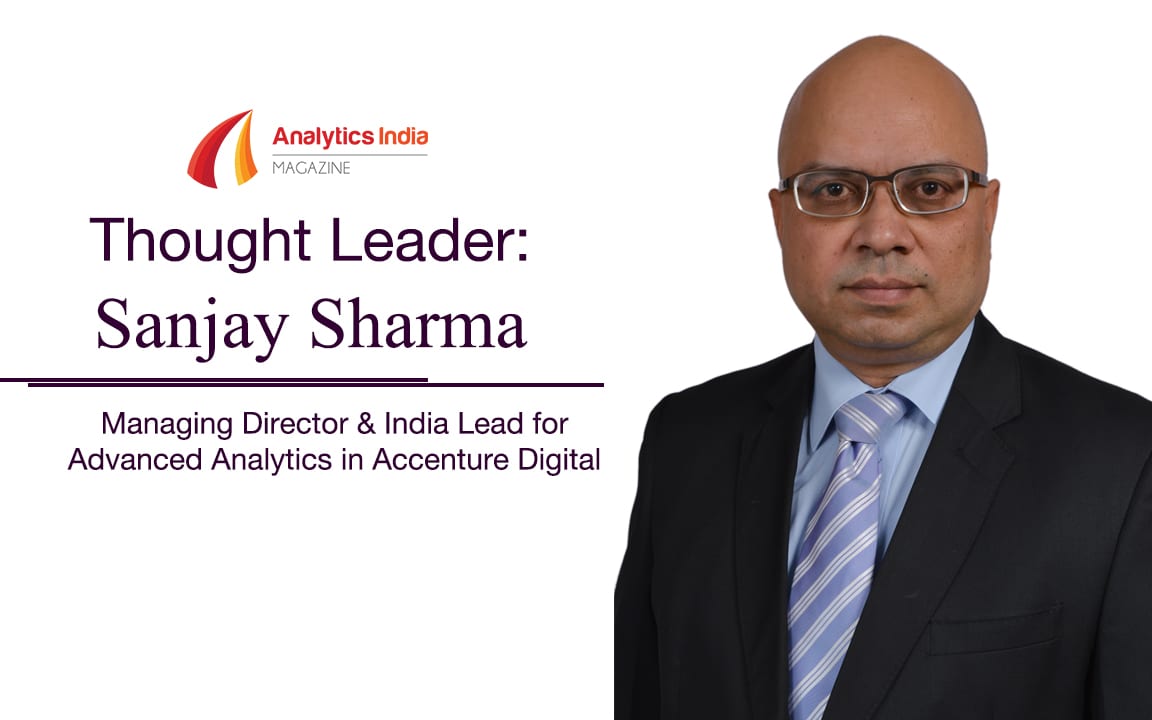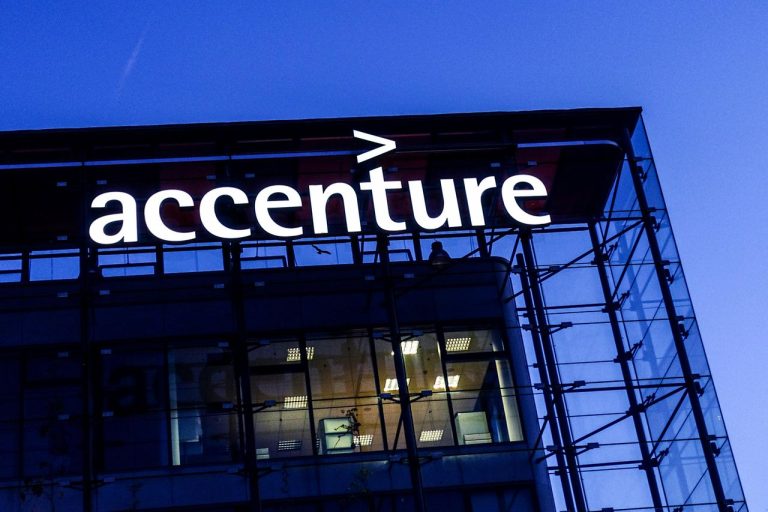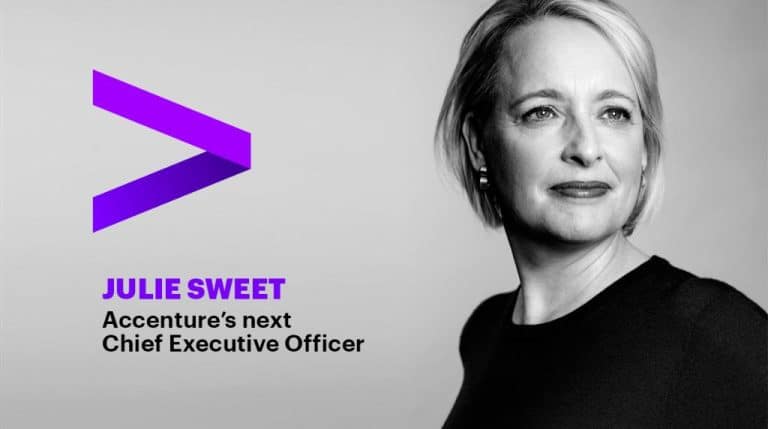 Sanjay Sharma, the Managing Director & India Lead for Advanced Analytics in Accenture Digital is a thought leader and inspiration for many in the analytics community.
Sanjay Sharma, the Managing Director & India Lead for Advanced Analytics in Accenture Digital is a thought leader and inspiration for many in the analytics community.
He has developed a whole spectrum of analytics practice ranging from ‘analytics for business transformation’ to ‘analytics as service’.
With more than 20 years of experience in application of advanced analytics across industry domains, his list of accomplishments and achievements is admirably long. Serving as a part of the advisory board of DMAI, a jury member for ECHO Award ‘15 for best marketing campaign organized by DMAI for APAC and an advisor for CMO Council India are amongst the many, to mention a few.
We present some excerpts from our interview below.
Analytics India Magazine: How did you start your career in Analytics and how has the journey been so far?
Sanjay Sharma: At that time analytics was not a planned career. With specialization in econometrics and passion for empirical research I started my career in a banking sector as a quantitative monetary economist responsible for end to end analysis of the financial value chain starting from developing business plan to performing profit simulation and predictions. This work helped bank to generate significant revenue impact which led me to take greater responsibility of applying these principles in Marketing Analytics. Next I worked on multiple facets of marketing analytics and have helped many organizations gain maturity in their marketing analytics value chain through marketing strategy formulations and its effective deployment and impact assessment.
Journey so far has been very exciting. I was fortunate to join the industry in its initial growth phase and there was a lot of demand for analytic skills. As a result, I had the opportunity to work in diverse functions like marketing, CRM, risk, liquidity management, fraud etc. So far, this industry has seen high growth.
AIM: How did you develop analytics across so many varied functions like Customer, Sales & Marketing, Supply Chain and retail analytics?
SS: I strongly believe that we should always start from industry domain, understanding its context and application of analytics on it. The second important dimension is functional expertise. For instance, if you want to develop a solution for customer relationship, then you need profound skills in it. Third dimension is possessing robust analytical capability. Any successful analytics ecosystem should have all three dimensions.
For successful functioning of analytical ecosystem there need to be absolute synergy between all the three areas that I have mentioned here. For example, an effective price & promotion management solution will have an impact on demand forecasting and fulfilment. Therefore, we can look at the same problem either from marketing angle or from supply chain angle. I started from marketing but leveraged these linkages to develop these related functions.
AIM: Why do you think analytics is needed in an organization?
SS: To keep it simple – scale and complexity are two important drivers. Let me give you an example: A vegetable vendor near my house is an expert in pricing. He knows what buyers are willing to pay so he charges hefty margins on low priced items and a thin margins on high priced items; he sells exotic stuff at a very low margin but ensures these items are available to prevent traffic of customers to alternative vendors. Do you notice preferred price points, item roles, assortment etc. He is doing all this based on his gut feeling. However if he needs to manage 5000 items across 100 stores in 20 geographies then application of analytics becomes critical.
AIM: What are the key differentiators in your analytical solutions?
SS: Our approach to analytics is not a standalone application of analytics but a comprehensive application of domain expertise, functional expertise, analytics and technology. We believe in collaborating and going vertical.
We expect our senior management and leadership to also contribute as data scientists and bring in holistic approaches and different facets to problem solving approach. Even though we have separate analytical practices for the ease of management, we work in collaboration to benefit exponentially.
AIM: Could you brief us about a specific use case in analytics that has brought significant value to your company?
SS: Let me pick a case with application of latest approaches. We worked with a big global company in paper manufacturing and plantation business. For them managing plantation and forests was a critical part of supply chain management. However measuring and monitoring thousands of hectares of forest is a stupendous task. We helped by remote sensing the plantation using drones and applied video analytics (using deep machine learning algorithms) to identify zero areas, pilferage, damage and status of growth. While cost of monitoring reduced to a fraction, productivity witnessed a quantum enhancement. This is one such application there are numerous such use cases to elaborate on. By helping our clients achieve their objectives we bring in lot of value to our organization as client centricity is one of our core principles.
AIM: What are the most significant challenges you face being at the forefront in analytics space?
SS: The most significant challenge is the changing nature of analytic solutions. Now, Artificial Intelligence has made a significant comeback since 2004-5. Consequently, the technology as well as the algorithms are changing fast. So learning has to be at a faster pace. The emerging big data, cloud computing and new algorithms has heightened the excitement and expectations which need to be managed.
AIM: What kind of knowledge and skill-sets do you look for, while you recruit?
SS: Person we recruit should be very high on problem solving skills. There is no space for ‘button pushers’. Anybody who wants to play a significant role in analytics will have to be a problem solver with deep analytical skills. Second critical aspect is the ability to code.
However none of the academic institutions have the tailored program which could groom the students to possess all these skill sets adequately. So, we recruit folks who are experts in at least two of these skills and train them for the other. We invest a lot in training to enhance their potential for professional success.
AIM: How do you think ‘Analytics’ as an industry is evolving today?
SS: Analytics as an industry is growing in three distinct directions. Firstly, application of analytics in solving specific problems and delivering outcomes; Secondly, pure analytics where a business problem is broken down and structured into an analytic problem and the vendor provides analytics. Third track of analytics is bundled and embedded within technology. Entire new generation analytics of big data, machine learning, Internet of Things (IOT) etc. belong to this track and is showing most robust growth in volume and value.
AIM: Could you tell us the most important contemporary trends that you see emerging in the present analytics space across the globe?
SS: The combo of technology and analytics is the growing trend along with changes in platforms, software and analytic techniques. There is a lot of focus on automation and ability to get insights from data sets hitherto unused or not available. We are seeing a data deluge in the form of huge volume, velocity and variety of information being generated. The key here is to derive meaningful insights from these data which help us progress meaningfully and gain competitive advantage. Most corporates are inclined towards open source and collective development of solution architecture and framework for major problems. I see democratization of data and analytics happening at the core of this revolution.


















































































